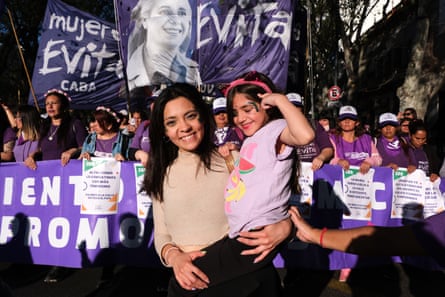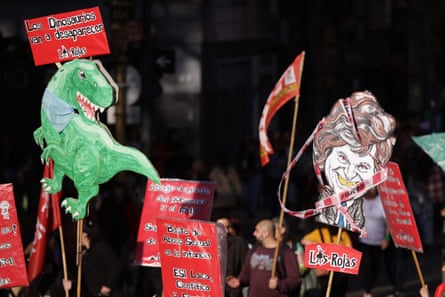“We are fighting against the presidential candidates who threaten the rights of women,” says Marilyna, 28, standing hand in hand with her friend outside Argentina’s National Congress last Thursday evening.
Argentina is three weeks away from a national election in which the rights of women and abortion have been put on the ballot, just three years after elective terminations were legalised. Marilyna is one of thousands of women, men and children protesting on the streets of Buenos Aires.
“We are afraid of the abortion referendum proposal and of the destructive policies that are being suggested in this election campaign. But we are fighting,” she says.
Behind her, elderly women wave green handkerchiefs, teenagers set off purple flares, and mothers march to the beat of steel drums with toddlers strapped to their backs.
Abortion was legalised in Argentina in 2020 after sweeping protests known as the “green wave” movement. Previously, abortions were only permitted in cases of rape or if the woman’s health was at risk.
But now women fear that those hard-won rights could be under threat.
On 22 October, the country heads to the polls in a highly contested election, in which the frontrunner Javier Milei has described abortion as murder.
In a recent interview, Milei, a 52-year-old far-right candidate and political outsider, reportedly said that those who support abortion rights are “brainwashed by a homicidal policy”. He vowed to launch a referendum to overturn the abortion law if he takes the presidency.
“Life starts at the moment of fertilisation. Three weeks after that, your mother decides to kill you because you are not alive yet. How come?” Milei said in August.
The former economist and TV pundit has also pledged to close the Ministry for Women, Gender and Diversity.
Partly in response to such rhetoric, the Ni Una Menos feminist movement organised protests across the South American country on International Safe Abortion Day.
Among those who gathered in the capital was 69-year-old Sandra Olue.
“We are here because we want to preserve the rights of women and abortion,” Olue says. “We fought for a long time, and are afraid this potential new president might cut our rights. We will not allow it.”

Cecilia Benitez marched holding her six-year-old daughter on her hip. “The far right is organising itself in Latin America, specifically Javier Milei and his henchmen, who are trying to undo our laws,” she says.
“He is organising his force like Donald Trump, and, like Trump, his proposals go against us, against women and LGBT people.”
The government estimates that 3,000 women died between 1983 and 2020, before the legalisation, due to clandestine abortions. Officials have said that maternal deaths have decreased by more than 40% since the law was enacted.
Despite such progress, abortion remains a fraught and divisive issue in the majority Roman Catholic country, even among health workers.
“There is still a lot of resistance to abortion,” says Soledad Deza, a lawyer and president of women’s group Fundación Mujeres x Mujeres. “There are entire public and private institutions that do not guarantee abortions because all their staff are objectors.
“Then there is ‘covert’ conscientious objection, which is perhaps more dangerous. Health personnel, instead of openly denying the service, mask it and carry out more harmful actions: they provide false information, and provide medication in insufficient doses.”

Doctors who perform abortions have also reportedly been targeted with spurious legal complaints. In August 2021, one doctor in Salta, a city in north-western Argentina, was detained following an accusation that she had performed an “illegal abortion”. She faced almost two years of criminal proceedings before she was acquitted.
Mexico’s supreme court recently ruled that state laws prohibiting abortion are unconstitutional and violate women’s rights, but despite the region’s green wave movement, the only other Latin American countries where elective abortion is legal are Colombia, Cuba, Guyana and Uruguay. In neighbouring Brazil, the supreme court is currently voting on whether to decriminalise abortion in the first 12 weeks of a pregnancy.
“Women’s rights have never been fully accepted in Latin America. There is a very strong presence of religions in public spaces and a very powerful network of political neoconservatism,” says Diaz. “The green wave does not stop, because we have to fight for our rights and defend them all the time.”
“People gave their lives for these rights and we have to defend against a terrible enemy,” says Ali Gondret, aged 64. “We are fighting for the girls who come after us, because what comes next may be very bad.”